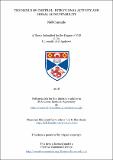Files in this item
The nexus of control: intentional activity and moral accountability
Item metadata
| dc.contributor.advisor | Snedegar, Justin | |
| dc.contributor.author | Conradie, Niël | |
| dc.coverage.spatial | iii, 206 p. | en_US |
| dc.date.accessioned | 2018-06-01T10:52:17Z | |
| dc.date.available | 2018-06-01T10:52:17Z | |
| dc.date.issued | 2018-06-28 | |
| dc.identifier.uri | https://hdl.handle.net/10023/13660 | |
| dc.description.abstract | There is a conceptual knot at the intersection of moral responsibility and action theory. This knot can be expressed as the following question: What is the relationship between an agent’s openness to moral responsibility and the intentional status of her behaviour? My answer to this question is developed in three steps. I first develop a control-backed account of intentional agency, one that borrows vital insights from the cognitive sciences – in the form of Dual Process Theory – in understanding the control condition central to the account, and demonstrate that this account fares at least as well as its rivals in the field. Secondly, I investigate the dominant positions in the discussion surrounding the role of control in moral responsibility. After consideration of some shortcomings of these positions – especially the inability to properly account for so-called ambivalence cases – I defend an alternative pluralist account of moral responsibility, in which there are two co-extant variants of such responsibility: attributability and accountability. The latter of these will be shown to have a necessary control condition, also best understood in terms of a requirement for oversight (rather than conscious or online control), and in terms of the workings of the dual system mechanism. I then demonstrate how these two accounts are necessarily related through the shared role of this kind of control, leading to my answer to the original question: if an agent is open to moral accountability based on some activity or outcome, this activity or outcome must necessarily have positive intentional status. I then apply this answer in a consideration of certain cases of the use of the Doctrine of Double Effect. | en_US |
| dc.language.iso | en | en_US |
| dc.publisher | University of St Andrews | |
| dc.rights | Attribution-NonCommercial-NoDerivatives 4.0 International | * |
| dc.rights.uri | http://creativecommons.org/licenses/by-nc-nd/4.0/ | * |
| dc.subject | Intention | en_US |
| dc.subject | Intentional action | en_US |
| dc.subject | Intentional activity | en_US |
| dc.subject | Control | en_US |
| dc.subject | Moral accountability | en_US |
| dc.subject | Moral attributability | en_US |
| dc.subject | Moral responsibility | en_US |
| dc.subject | Reasons-responsiveness | en_US |
| dc.subject | Elizabeth Anscombe | en_US |
| dc.subject | Gunnar Björnsson | en_US |
| dc.subject | Dual process theory | en_US |
| dc.subject | Quality of will | en_US |
| dc.subject | Action theory | en_US |
| dc.subject | Actions as processes | en_US |
| dc.subject | Doctrine of double effect | en_US |
| dc.subject.lcsh | Ethics | en |
| dc.subject.lcsh | Decision making--Moral and ethical aspects | en |
| dc.subject.lcsh | Control (Psychology) | en |
| dc.subject.lcsh | Responsibility | en |
| dc.subject.lcsh | BJ1419.C7 | en |
| dc.title | The nexus of control: intentional activity and moral accountability | en_US |
| dc.type | Thesis | en_US |
| dc.type.qualificationlevel | Doctoral | en_US |
| dc.type.qualificationname | PhD Doctor of Philosophy | en_US |
| dc.publisher.institution | The University of St Andrews | en_US |
The following licence files are associated with this item:
This item appears in the following Collection(s)
Except where otherwise noted within the work, this item's licence for re-use is described as Attribution-NonCommercial-NoDerivatives 4.0 International
Items in the St Andrews Research Repository are protected by copyright, with all rights reserved, unless otherwise indicated.


